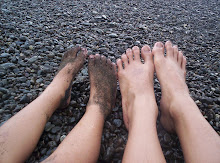
We adopted a stray puppy when we moved to Cavite. It was ugly, but it looked like it had the potential to bite thieves, so it stayed. My daughter named it Bruno. We soon realized that Bruno is actually a girl, and my daughter promptly changed the name to 'Brunei.' Soon Brunei had puppies, and they were named Brownie (because it was brown), Whitey (because it was white), and Cutie (because... you guessed it, it was cute).
She also had a pet white rat, named Stuart Little (from the movie, of course). Stuart Little was left in the terrace one night, and in the morning we found the overturned cage, with the culprit still napping beside it. The criminal is Blacky the Cat, whose picture also graces this blog. You don't have to ask me why he is named so.
We also breed African love birds. We have Mulan and General Shang, Jack and Jill, Ariel and Prince Eric. When the birds multiplied, she said it was too much trouble to keep track of all of them, and so they became generically identified by color: Blue and Green, Yellow-Green Pair, White Pair.
And yes, we have Gohan the cat, so named because my husband and daughter are avid fans of Dragon Ball Z, and also because Gohan has this capacity to fly when kicked. For that, he earned one blog post dedicated to him.
My husband also keep fighting cocks. My daughter would inspect them and briefly considered naming each one, but they all looked the same and weren't very friendly, so she gave them up for a lost cause in the order of names. They were just "Hoy, Manok! Kumain ka na!"
She bought a fighting fish for Christmas, bright red, and named it Cutie. She also recycles names, you see, since Cutie the dog had been given away when it turned out to be another girl (and therefore had the capacity to reproduce, which is undesirable in our house). Cutie died of overfeeding one week later. I have a suspicion it also died of exhaustion, because my daughter sometimes stirred the fishbowl with a straw so Cutie could exercise.
Because she did not want to be heartbroken over the demise of Cutie the fish, my daughter got a guinea pig for New Year. It is white, with brown ears. It eats a whole carrot in a single afternoon and pees with abandon. My daughter insists that each pet be called by their proper names. So yes, I cringe whenever I refer to the darned guinea pig.
You see, she named it Angel Locsin.














































